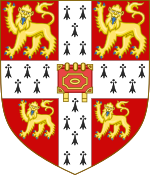
Back Кембриџь ауниверситет Abkhazian Universiteit van Cambridge Afrikaans ዩኒቨርስቲ ኦፍ ኬምብሪጅ Amharic Universidat de Cambridge AN कैम्ब्रिज विश्वविद्यालय ANP جامعة كامبريدج Arabic لجامعة د كامبريدج ARY جامعة كامبريدج ARZ কেমব্ৰিজ বিশ্ববিদ্যালয় Assamese Universidá de Cambridge AST
 | |
| Latin: Universitas Cantabrigiensis[1][2][3] | |
Other name | The Chancellor, Masters and Scholars of the University of Cambridge |
|---|---|
| Motto | Latin: Hinc lucem et pocula sacra |
Motto in English | Literal: From here, light and sacred draughts. Nonliteral: From this place, we gain enlightenment and precious knowledge. |
| Type | Public research university Ancient university |
| Established | c. 1209 |
| Endowment | £2.47 billion (2023; excluding colleges)[4] |
| Budget | £2.32 billion (2022/2023; excluding colleges)[5] |
| Chancellor | The Lord Sainsbury of Turville |
| Vice-Chancellor | Deborah Prentice |
Academic staff | 5,940 (2022/23)[6] |
Administrative staff | 6,525 (2022/23)[6] |
| Students | 22,975 (2022/23)[7] |
| Undergraduates | 13,750 (2022/23)[7] |
| Postgraduates | 9,225 (2022/23)[7] |
| Location | , England |
| Campus |
|
| Colours | Cambridge Blue[10] |
| Affiliations | |
| Website | cam |
 | |
The University of Cambridge is a public collegiate research university in Cambridge, England. Founded in 1209, the University of Cambridge is the world's third-oldest university in continuous operation. The university's founding followed the arrival of scholars who left the University of Oxford for Cambridge after a dispute with local townspeople.[11][12] The two ancient English universities, although sometimes described as rivals, share many common features and are often jointly referred to as Oxbridge.
In 1231, 22 years after its founding, the university was recognised with a royal charter, granted by King Henry III. The University of Cambridge includes 31 semi-autonomous constituent colleges and over 150 academic departments, faculties, and other institutions organised into six schools. The largest department is Cambridge University Press & Assessment, which has £1 billion of annual revenue and reaches 100 million learners.[13] All of the colleges are self-governing institutions within the university, managing their own personnel and policies, and all students are required to have a college affiliation within the university. Undergraduate teaching at Cambridge is centred on weekly small-group supervisions in the colleges with lectures, seminars, laboratory work, and occasionally further supervision provided by the central university faculties and departments.[14][15]
The university operates eight cultural and scientific museums, including the Fitzwilliam Museum and Cambridge University Botanic Garden. Cambridge's 116 libraries hold a total of approximately 16 million books, around nine million of which are in Cambridge University Library, a legal deposit library and one of the world's largest academic libraries. Cambridge alumni, academics, and affiliates have won 124 Nobel Prizes.[16] Among the university's notable alumni are 194 Olympic medal-winning athletes[17] and several historically iconic and transformational individuals in their respective fields, including Francis Bacon, Lord Byron, Oliver Cromwell, Charles Darwin, Rajiv Gandhi, John Harvard, Stephen Hawking, John Maynard Keynes, John Milton, Vladimir Nabokov, Jawaharlal Nehru, Isaac Newton, Sylvia Plath, Bertrand Russell, Alan Turing, Ludwig Wittgenstein, and others.
- ^ Record of the Jubilee Celebrations of the University of Sydney. Sydney, New South Wales: William Brooks and Co. 1903. ISBN 9781112213304.
- ^ Records of The Tercentenary Festival of Dublin University. Dublin, Ireland: Hodges, Figgis & Co. 1894. ISBN 9781355361602.
- ^ Actes du Jubilé de 1909 (in Swiss French). Geneva, Switzerland: Georg Keck & Cie. 1910. ISBN 9781360078335.
- ^ "Reports and the Financial Statements 2023" (PDF). University of Cambridge. Retrieved 14 June 2024.
- ^ "Reports and the Financial Statements 2023". University of Cambridge. Retrieved 14 June 2024.
- ^ a b "Who's working in HE?". www.hesa.ac.uk. Higher Education Statistics Agency.
- ^ a b c "Where do HE students study? | HESA". hesa.ac.uk. Higher Education Statistics Agency.
- ^ "Operational Estate Facts & Figures". Estates Division. University of Cambridge. July 2021. Archived from the original on 1 March 2023. Retrieved 28 February 2023.
- ^ "Farm Facts & Figures". Estates Division. University of Cambridge. June 2020. Archived from the original on 1 March 2023. Retrieved 28 February 2023.
- ^ "Identity Guidelines – Colour" (PDF). University of Cambridge Office of External Affairs and Communications. Archived from the original (PDF) on 10 September 2008. Retrieved 28 March 2008.
- ^ Catto, J. I. (1984). The History of the University of Oxford: I The Early Oxford Schools (1st ed.). Oxford: Clarendon Press. pp. 37–41. ISBN 0199510113.
- ^ "A Brief History: Early records". University of Cambridge. Archived from the original on 2 September 2011. Retrieved 17 August 2008.
- ^ "Cambridge University Press & Assessment grows global impact". University of Cambridge. November 2023. Retrieved 29 January 2024.
- ^ Tapper, Ted; Palfreyman, David (2011). "The Tutorial System: The Jewel in the Crown". Oxford, the Collegiate University. Higher Education Dynamics. Vol. 34. Springer. pp. 95–115. doi:10.1007/978-94-007-0047-5_6. ISBN 978-94-007-0046-8. ISSN 1571-0378. Archived from the original on 7 June 2021. Retrieved 7 June 2021.
- ^ "What should students expect from their College and the University?". University of Cambridge. December 2017. Archived from the original on 7 June 2021. Retrieved 7 June 2021.
- ^ "University of Cambridge alumni awarded 2024 Nobel Prize in Chemistry | University of Cambridge". www.cam.ac.uk. 9 October 2024. Retrieved 10 October 2024.
- ^ "All Known Cambridge Olympians Archived 8 March 2021 at the Wayback Machine". Hawks Club. Retrieved 17 May 2019.
Cite error: There are <ref group=lower-alpha> tags or {{efn}} templates on this page, but the references will not show without a {{reflist|group=lower-alpha}} template or {{notelist}} template (see the help page).